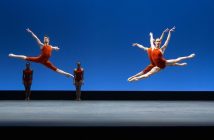Northern Ballet has gone all 50 Shades. Don’t panic: you won’t have to sit awkwardly next to your family members, ruing your own suggestion. But there is considerably more raunchiness onstage than you might expect from a night at the ballet. Unless that ballet is based on the life of Giacomo Casanova, that is.
Taking Ian Kelly’s biographical text as inspiration, Kenneth Tindall has choreographed the life of the infamous Italian seducer into a full length, two-act piece for the Leeds-based company, which is touring the country with it. It is brooding and it is fashionable, but it buckles under the weight of its own plot. And whilst the ensemble oozes with hints at depravity, the main man lacks the one thing that Casanova simply had to have had in bucket loads: charisma.

Casanova was a busy fellow. We meet him in Venice as a budding priest who is unceremoniously thrown out of the seminary for lusting after a flame-haired pair of sisters. He then joins a troupe of musicians, is bequeathed a large fortune by an admiring cardinal, but then put in jail for offending The Inquisition with his risqué ways. Once free, he lives it up in Paris, where he comes across Madame de Pompadour and many, many other women, including a young mother escaping from an abusive marriage. Despite reasonably affectionate intentions, he ultimately betrays her before experiencing a belated attack of conscience that inspires him to pen his memoirs. There is much lusting in between of course, and flings aplenty – of varying significance – speckled about.
This might all make for an enrapturing TV drama but it leaves Tindall with an awful lot to try and convey in purely physical form. There is a reason nothing much tends to happen in ballets, and that is because it’s difficult enough to convey the simplest of emotions and events clearly, before even trying to add elegance or creativity to the mix.
An overly complex plot leaves the dancers far too busy to imbue their characters with just that – character – and this particular envisioning has them dashing around with little time to develop their personas, far too long spent making frantic hand signals. It is rather tiring to watch – one feels restless from trying to process everything occurring onstage correctly. What if we miss something crucial? It also leaves one wanting more: there are flashes of real brilliance, moments of gleeful decadence and passion, but they tend to get cut short by the next major life event. It’s not Casanova’s fault (or at least, there’s no point blaming him now), but his life doesn’t make a natural ballet.

Nonetheless, there are some standout performances, particularly among Casanova’s conquests. Dreda Blow is impish and beguiling as the cross-dressing Bellino, contrasting Hannah Bateman’s dignified Henriette. The feisty Savorgnan sisters who affect Casanova’s original downfall are danced with strength and flair by Abigail Prudames and Minju Kang.
There is also extremely powerful stylization. Under Christopher Oram’s imposingly gilded set, the opening church scene is grey and ominous with pews fiercely wheeled across the stage to suggest a fervent collective devotion in play. When the curtain rises on the second act, the individual colours of each courtesan lounging over their chairs, Cabaret style, give a sense of fun, of a party to be joined. As the girls recline effortlessly over these exceedingly uncomfortable-looking pieces of furniture, the sumptuous slowness of their movement is a rare treat; it is a glorious moment, but all too fleeting.

Sure enough, action soon resumes. And Tindall has taken notable inspiration from Kenneth Macmillan, his action-filled pas de deux reaching achingly up to Mayerling’s variant climaxes. The music is broad and cinematic, which creates drama and suspense. But that is all rather let down by the lack of magnetism in old Casanova himself. Guilano Contadini is highly proficient and lord knows he must have a good deal of strength to execute the acrobatic love scenes that so abound, but Casanova was meant to send underwear flying just by walking into a room – he was meant to have been irresistible, the personification of charm. And this one was just a bit goofy. This one paled in comparison to Mlindi Kulashe for instance – one of his purposeful interrogators. And whilst this is not a fatal complaint, it’s not meant to be this way around.
The Northern Ballet has made a good start with Casanova. It’s enjoyable, it’s stylish and it’s got a fair whack of drama included, but there is work to be done before this production becomes a national favourite. Perhaps they should try Netflix instead.
Northern Ballet’s Casanova premiered at Sadler’s Wells on 9th May 2017. For more information and please visit the website. Images by Emma Kauldhar.




